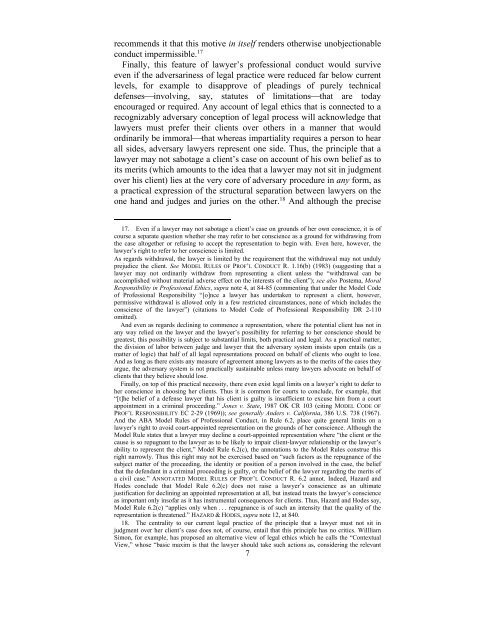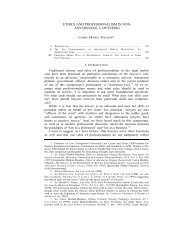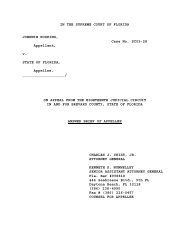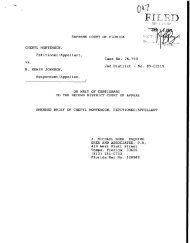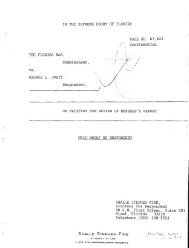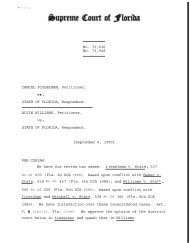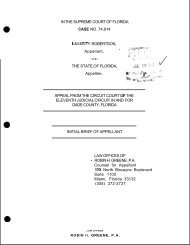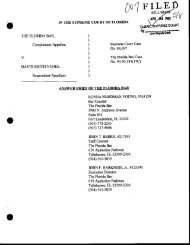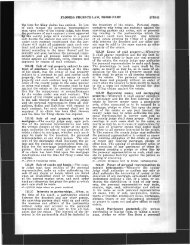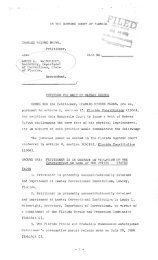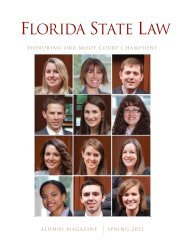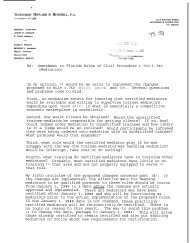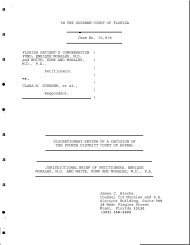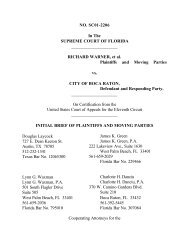The Morals and Politics of Adversary Lawyers - Florida State ...
The Morals and Politics of Adversary Lawyers - Florida State ...
The Morals and Politics of Adversary Lawyers - Florida State ...
Create successful ePaper yourself
Turn your PDF publications into a flip-book with our unique Google optimized e-Paper software.
ecommends it that this motive in itself renders otherwise unobjectionable<br />
conduct impermissible. 17<br />
Finally, this feature <strong>of</strong> lawyer’s pr<strong>of</strong>essional conduct would survive<br />
even if the adversariness <strong>of</strong> legal practice were reduced far below current<br />
levels, for example to disapprove <strong>of</strong> pleadings <strong>of</strong> purely technical<br />
defenses⎯involving, say, statutes <strong>of</strong> limitations⎯that are today<br />
encouraged or required. Any account <strong>of</strong> legal ethics that is connected to a<br />
recognizably adversary conception <strong>of</strong> legal process will acknowledge that<br />
lawyers must prefer their clients over others in a manner that would<br />
ordinarily be immoral⎯that whereas impartiality requires a person to hear<br />
all sides, adversary lawyers represent one side. Thus, the principle that a<br />
lawyer may not sabotage a client’s case on account <strong>of</strong> his own belief as to<br />
its merits (which amounts to the idea that a lawyer may not sit in judgment<br />
over his client) lies at the very core <strong>of</strong> adversary procedure in any form, as<br />
a practical expression <strong>of</strong> the structural separation between lawyers on the<br />
one h<strong>and</strong> <strong>and</strong> judges <strong>and</strong> juries on the other. 18 And although the precise<br />
17. Even if a lawyer may not sabotage a client’s case on grounds <strong>of</strong> her own conscience, it is <strong>of</strong><br />
course a separate question whether she may refer to her conscience as a ground for withdrawing from<br />
the case altogether or refusing to accept the representation to begin with. Even here, however, the<br />
lawyer’s right to refer to her conscience is limited.<br />
As regards withdrawal, the lawyer is limited by the requirement that the withdrawal may not unduly<br />
prejudice the client. See MODEL RULES OF PROF’L CONDUCT R. 1.16(b) (1983) (suggesting that a<br />
lawyer may not ordinarily withdraw from representing a client unless the “withdrawal can be<br />
accomplished without material adverse effect on the interests <strong>of</strong> the client”); see also Postema, Moral<br />
Responsibility in Pr<strong>of</strong>essional Ethics, supra note 4, at 84-85 (commenting that under the Model Code<br />
<strong>of</strong> Pr<strong>of</strong>essional Responsibility “[o]nce a lawyer has undertaken to represent a client, however,<br />
permissive withdrawal is allowed only in a few restricted circumstances, none <strong>of</strong> which includes the<br />
conscience <strong>of</strong> the lawyer”) (citations to Model Code <strong>of</strong> Pr<strong>of</strong>essional Responsibility DR 2-110<br />
omitted).<br />
And even as regards declining to commence a representation, where the potential client has not in<br />
any way relied on the lawyer <strong>and</strong> the lawyer’s possibility for referring to her conscience should be<br />
greatest, this possibility is subject to substantial limits, both practical <strong>and</strong> legal. As a practical matter,<br />
the division <strong>of</strong> labor between judge <strong>and</strong> lawyer that the adversary system insists upon entails (as a<br />
matter <strong>of</strong> logic) that half <strong>of</strong> all legal representations proceed on behalf <strong>of</strong> clients who ought to lose.<br />
And as long as there exists any measure <strong>of</strong> agreement among lawyers as to the merits <strong>of</strong> the cases they<br />
argue, the adversary system is not practically sustainable unless many lawyers advocate on behalf <strong>of</strong><br />
clients that they believe should lose.<br />
Finally, on top <strong>of</strong> this practical necessity, there even exist legal limits on a lawyer’s right to defer to<br />
her conscience in choosing her clients. Thus it is common for courts to conclude, for example, that<br />
“[t]he belief <strong>of</strong> a defense lawyer that his client is guilty is insufficient to excuse him from a court<br />
appointment in a criminal proceeding.” Jones v. <strong>State</strong>, 1987 OK CR 103 (citing MODEL CODE OF<br />
PROF’L RESPONSIBILITY EC 2-29 (1969)); see generally Anders v. California, 386 U.S. 738 (1967).<br />
And the ABA Model Rules <strong>of</strong> Pr<strong>of</strong>essional Conduct, in Rule 6.2, place quite general limits on a<br />
lawyer’s right to avoid court-appointed representation on the grounds <strong>of</strong> her conscience. Although the<br />
Model Rule states that a lawyer may decline a court-appointed representation where “the client or the<br />
cause is so repugnant to the lawyer as to be likely to impair client-lawyer relationship or the lawyer’s<br />
ability to represent the client,” Model Rule 6.2(c), the annotations to the Model Rules construe this<br />
right narrowly. Thus this right may not be exercised based on “such factors as the repugnance <strong>of</strong> the<br />
subject matter <strong>of</strong> the proceeding, the identity or position <strong>of</strong> a person involved in the case, the belief<br />
that the defendant in a criminal proceeding is guilty, or the belief <strong>of</strong> the lawyer regarding the merits <strong>of</strong><br />
a civil case.” ANNOTATED MODEL RULES OF PROF’L CONDUCT R. 6.2 annot. Indeed, Hazard <strong>and</strong><br />
Hodes conclude that Model Rule 6.2(c) does not raise a lawyer’s conscience as an ultimate<br />
justification for declining an appointed representation at all, but instead treats the lawyer’s conscience<br />
as important only ins<strong>of</strong>ar as it has instrumental consequences for clients. Thus, Hazard <strong>and</strong> Hodes say,<br />
Model Rule 6.2(c) “applies only when . . . repugnance is <strong>of</strong> such an intensity that the quality <strong>of</strong> the<br />
representation is threatened.” HAZARD & HODES, supra note 12, at 840.<br />
18. <strong>The</strong> centrality to our current legal practice <strong>of</strong> the principle that a lawyer must not sit in<br />
judgment over her client’s case does not, <strong>of</strong> course, entail that this principle has no critics. Willliam<br />
Simon, for example, has proposed an alternative view <strong>of</strong> legal ethics which he calls the “Contextual<br />
View,” whose “basic maxim is that the lawyer should take such actions as, considering the relevant<br />
7


